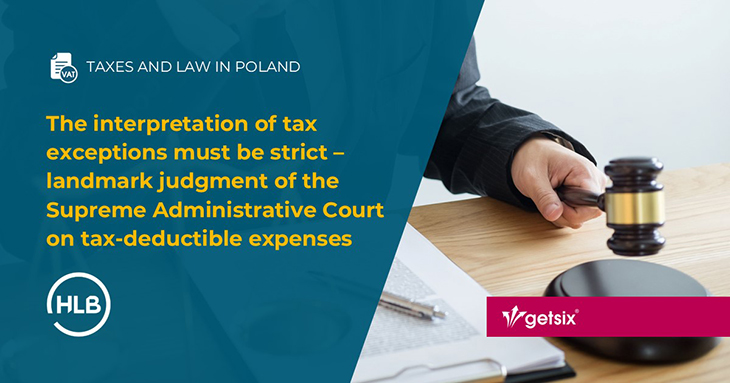The interpretation of tax exceptions must be strict – landmark judgment of the Supreme Administrative Court on tax-deductible expenses
On December 19, 2024, the Supreme Administrative Court of Poland (in Polish: NSA – Naczelny Sąd Administracyjny) issued a landmark judgment in case II FSK 409/22, concerning the interpretation of Article 16(1)(22) of the Corporate Income Tax (CIT) Act in Poland. The Court unequivocally stated that this provision, as an exception to the general rule allowing expenses to be classified as tax-deductible expenses, must be interpreted strictly.
Scope of the tax exclusion
According to Article 16(1)(22) of the Polish CIT Act, contractual penalties and damages related to defects in goods, construction works, or services cannot be classified as tax-deductible costs. The Supreme Administrative Court emphasized that this regulation applies only to economic events based on a defect in performance — whether in the form of defective goods, services, or completed construction work. Consequently, this provision cannot be extended to other cases that do not result from defects in the performance.
Key aspect of the judgment – timeliness vs. quality of service
In the case reviewed by the Supreme Administrative Court, the taxpayer incurred a contractual penalty for failure to provide a service on time. The Polish tax authorities argued that this cost should also be excluded from tax-deductible expenses, claiming that the penalty resulted from improper performance of an obligation, similar to defective performance. However, the Supreme Administrative Court rejected this interpretation, clearly stating that the untimely performance of a service does not fall within the catalog of events specified in Article 16(1)(22) of the CIT Act.
Implications of the judgment for taxpayers in Poland
The judgment of the Supreme Administrative Court is crucial for businesses in Poland that incur contractual penalties. The judgment indicates that:
- only contractual penalties and damages directly related to defects in goods, construction works, or services are excluded from tax-deductible expenses.
- other contractual penalties, including those arising from delays in contract performance, may be considered tax-deductible expenses, provided they meet the general rules on tax-deductible expenses.
- Polish tax authorities cannot arbitrarily extend the scope of the tax exclusion set forth in Article 16(1)(22).
Conclusion
The judgment of the Supreme Administrative Court in case II FSK 409/22 confirms that the provisions excluding costs from tax-deductible expenses cannot be interpreted broadly, but only within the limits resulting from their literal wording. Thanks to this, taxpayers have obtained significant confirmation that contractual penalties not related to the defectiveness of performance may be treated as tax-deductible expenses, which has direct implications for business operations and tax settlements in Poland.
If you have any questions regarding the settlement of tax-deductible expenses in Poland or require support in interpreting Polish tax regulations, we encourage you to contact our experts. We offer comprehensive advisory services to help businesses operate safely and in full compliance with Polish tax laws.
If you have any questions regarding this topic or if you are in need for any additional information – please do not hesitate to contact us:
CUSTOMER RELATIONSHIPS DEPARTMENT

ELŻBIETA
NARON-GROCHALSKA
Head of Customer Relationships
Department / Senior Manager
getsix® Group
***














